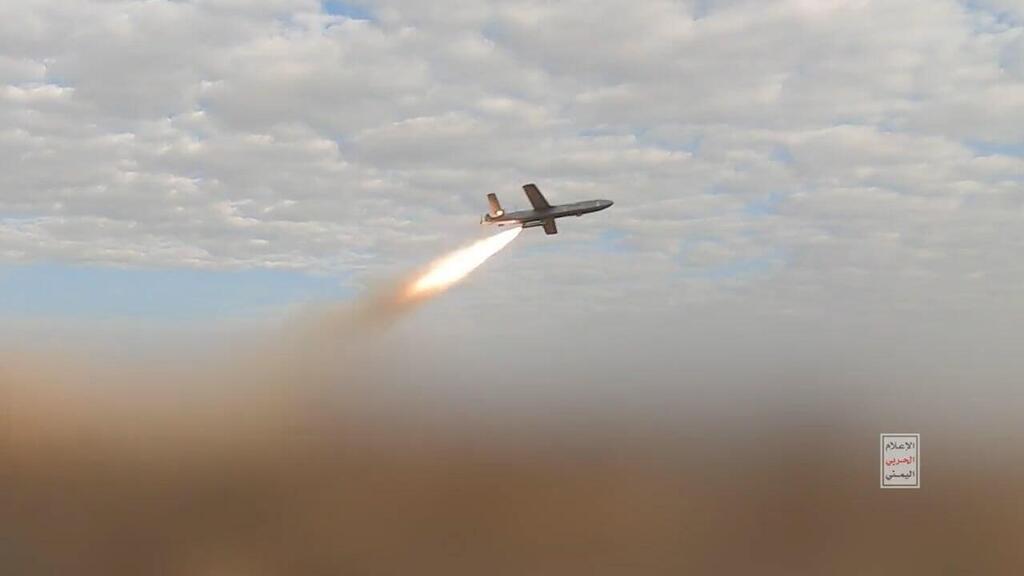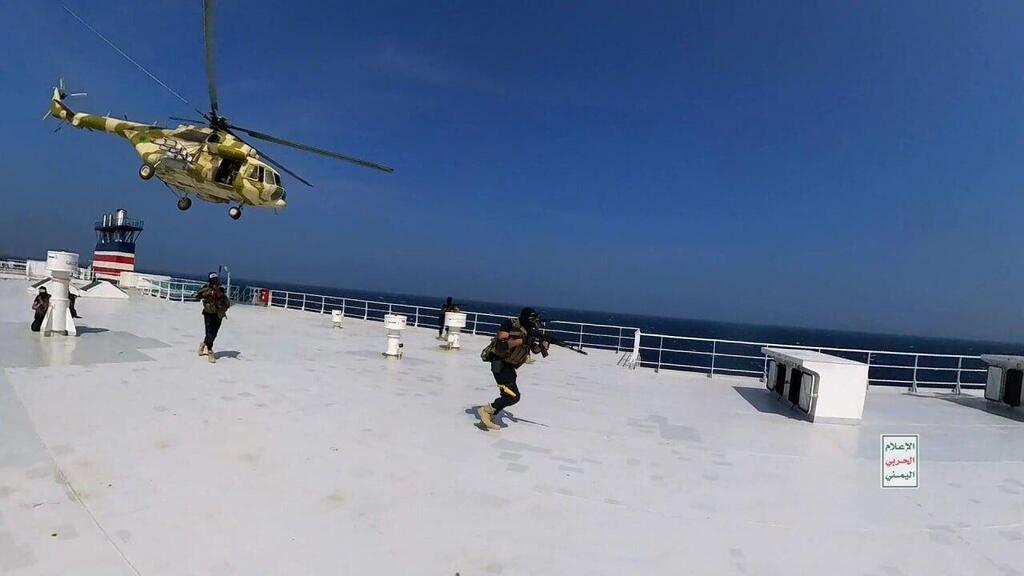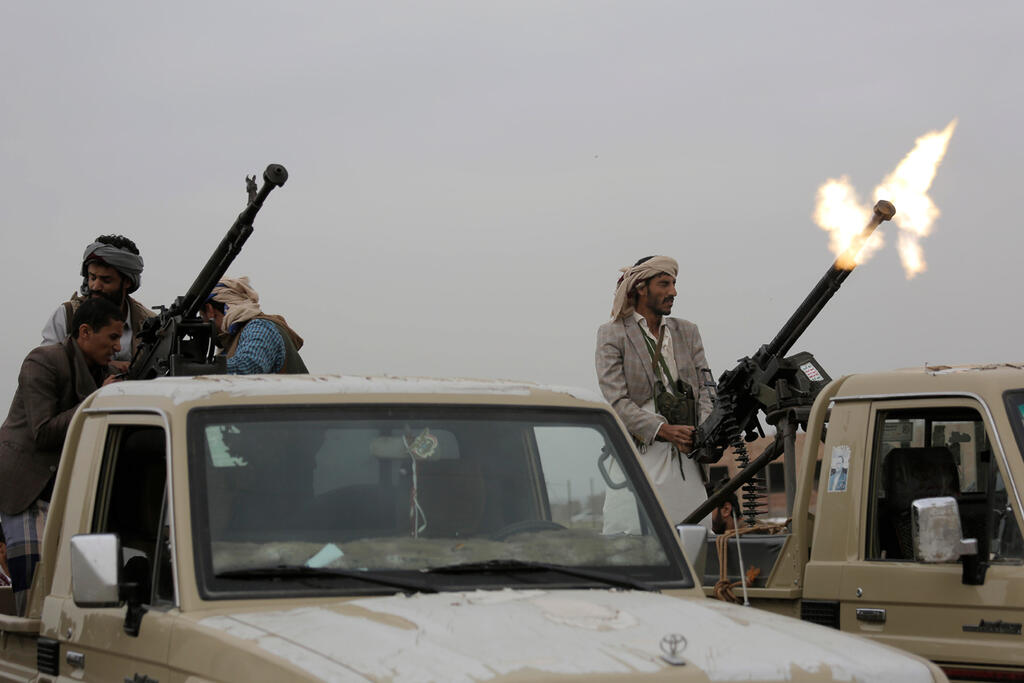Houthi spokesperson Yahya Sare'e claimed on Sunday the Iranian-backed rebels’ navy attacked two "Israeli ships" in the Bab al-Mandab Strait which connects the Red Sea to the Indian Ocean.
Read more:
According to Sare'e, the Houthi navy launched a missile at one of the ships and attacked the other with a drone, after "the ships did not respond to warning messages." Sare'e added, "We renew our warning to all Israeli ships - or those linked to Israelis - that they will become legitimate targets."
Ynet has learned that one of the two cargo ships attacked by the Houthis in the Red Sea sustained only minor damage and was not Israeli. However, one of its shareholders is reportedly an Israeli businessman. According to the Telegraph, the vessel was sailing under the Bahamas flag.
The second incident appears to be a case of mistaken identity - a British ship, referred to as Ship Number 9, which was passing near Yemen through the Bab al-Mandab Strait, was severely damaged by a surface-to-sea missile and is at risk of sinking, with thousands of containers sinking to the depths. There are no Israeli crew members on the ship.
Israeli security officials reported an attempted attack in the Red Sea has been thwarted after the United Kingdom reported UAV activity and a "potential explosion" near the Bab al-Mandab Strait, which connects Eastern Africa and the Arabian Peninsula.
In a statement published by the United Kingdom's Maritime Trade Operations Agency (UKMTO), it was stated that the detected UAVs came from Yemen, but it did not explicitly state whether the Houthi rebels in Yemen, who since the outbreak of the war against Hamas, have launched several UAVs and missiles towards Israel - and threatened to attack any Israeli ship or one connected to Israel. The UKMTO called on ships in the area to exercise extreme caution.
Today's event comes, as mentioned, against the backdrop of the attacks by the Houthis, Iran's allies, who have carried out a series of attacks against Israel in the past two months and are now trying to damage its maritime trade - and in fact have already recorded some success, when the Zim company announced last week that it would divert ships away from the attacked route in the Red Sea, where ships pass from Asia to Israel and Europe. According to sources in the import industry, the decision will lead to delays in deliveries that will last between 30-50 days, depending on the country of origin and the containers.
In the shadow of the high tensions, last week there was also a report of an attempted hijacking of a tanker sailing in the Gulf of Aden, and the Houthis were seen as the immediate suspects - but after the American Navy came to the aid of the ship and captured five armed men, it became clear that these were pirates who also operate in the area.
A few days before that incident, another Israeli-owned ship was attacked by an Iranian drone in the Gulf of Aden, and last month the Houthis took control of another ship that they claimed belonged to Israel, although in Israel they claimed that it was not an Israeli ship and that it belonged to a British company and was operated by a Japanese company. Among the 22 crew members on this ship, there were no Israelis.
Houthi rebels hijack cargo ship in Red Sea
The hijacking of the ship last month happened after the Houthis threatened to act against any ship linked to Israel. They even called on the countries of the world to "remove their citizens working on the ships, to avoid shipping or working on these ships, and to inform the ships to stay away from them". The realization of the threat raises doubts about the possibility of a renewal of the "naval war of shadows" that was previously reported to be going on between Israel and Iran - and during which several ships connected to Israel were damaged and, on the other hand, ships connected to Iran were also damaged.
In the last month, Israel threatened to respond to the attacks launched by the Houthis, but so far no such response is known. Last Thursday, there were indeed reports of explosions in which missile batteries and UAVs were hit in Sana'a, which is controlled by the Houthis, but our security and military commentator Ron Ben Yishai estimates that it is unlikely that Israel was behind this attack. The Americans also denied involvement. Ben Yishai estimates that the suspects The main ones in the explosion in Sana'a are the members of the Yemeni government that sits in the city of Aden, which is recognized by the international community and has been fighting against the Houthis for years as part of the bloodiest civil war in the war.
'Won't hesitate to expand military ops against Israel'
The spokesman of the Houthi army emphasized before the resumption of the war that the forces "will not hesitate to expand their military operations against Israel, against targets at sea or on land and that the military operations will stop when the Israeli attacks against the Palestinian people in the Gaza Strip stop." The renewal of the threat came even though the threat from the Houthis was not completely removed even during the cease-fire. The deputy prime minister of the Houthis said the day after the cease-fire came into force that the decision to close the Red Sea to Israel "is still in effect".
Apart from the security threat, the statements of the Houthis pose a threat to the maritime, international and Israeli trade, when the Houthis are actually presenting a new situation in the maritime area of Yemen under their control. The Strait of Bab al-Mandab is between Djibouti and Yemen and actually connects the continent of Asia to the continent of Africa. According to publications, 10% of the international maritime trade passes through the strait every year, on about 21 thousand ships. 6 million barrels of oil pass through it every day.
The Houthis threaten "ships flying the Israeli flag, managed by Israeli companies or owned by Israelis" that pass through Bab al-Mandab, and this may affect Israel's trade with the East, especially with Asia. The Houthis emphasize in their statements that they are not "aiming at world trade in the Red Sea, but only at ships connected to Israel."
According to Al Jazeera, following the Houthi threat, the Israeli side will have to pay much more for joint work with ships in the maritime areas close to Yemen. The ships that work with Israel and may find themselves in danger, will demand a higher payment from the Israeli side or from any third party that works with Israel, which will make the whole process more expensive.
It said that if the danger continues, the alternative will be air or land transport, which also means higher costs, which will have a negative impact on Israel's foreign trade. In other words, the event of the takeover of the ship Galaxy Leader was, apart from the security threat, an injury to Israel's foreign trade.
According to publications, the shipping costs, since the hijacking of the ship, have already increased and in addition, due to the fear of approaching the dangerous areas under the control of the Houthis, some ships have already been forced to sail and make the long round of the African circumnavigation, instead of passing directly through the Red Sea.
A member of the Houthi Supreme Political Council, Hazam al-Assad referred last month to the fact that the Israeli ships or the ships working with Israel will be forced to circle Africa. On his Twitter account he wrote: "As long as they insist on aggression against our people in Gaza, they must take the route of the Cape of Good Hope" when he means that Israeli ships will have to circle all of Africa to reach the Gulf of Eilat or leave the Red Sea and reach the Indian Ocean, and pass Across the Cape of Good Hope which is in the southwest of the African continent.
The Houthis control a large part of Yemen's west coast and overlook a wide area of the Red Sea and the Strait of Bab al-Mandab, one of the world's busiest shipping lanes. However, Western officials have claimed in recent weeks that despite the threats of the Houthis, the main danger facing commercial ships in the Red Sea is from pirates in the region and that the Houthis are mainly active as a land force and do not have high naval capabilities like the Somalis.
However, with additional Iranian support, things could change. It is expected that even if there is no significant decrease in maritime trade in the region, costs will still increase, due to a significant increase in insurance rates and hence an increase in shipping costs.









